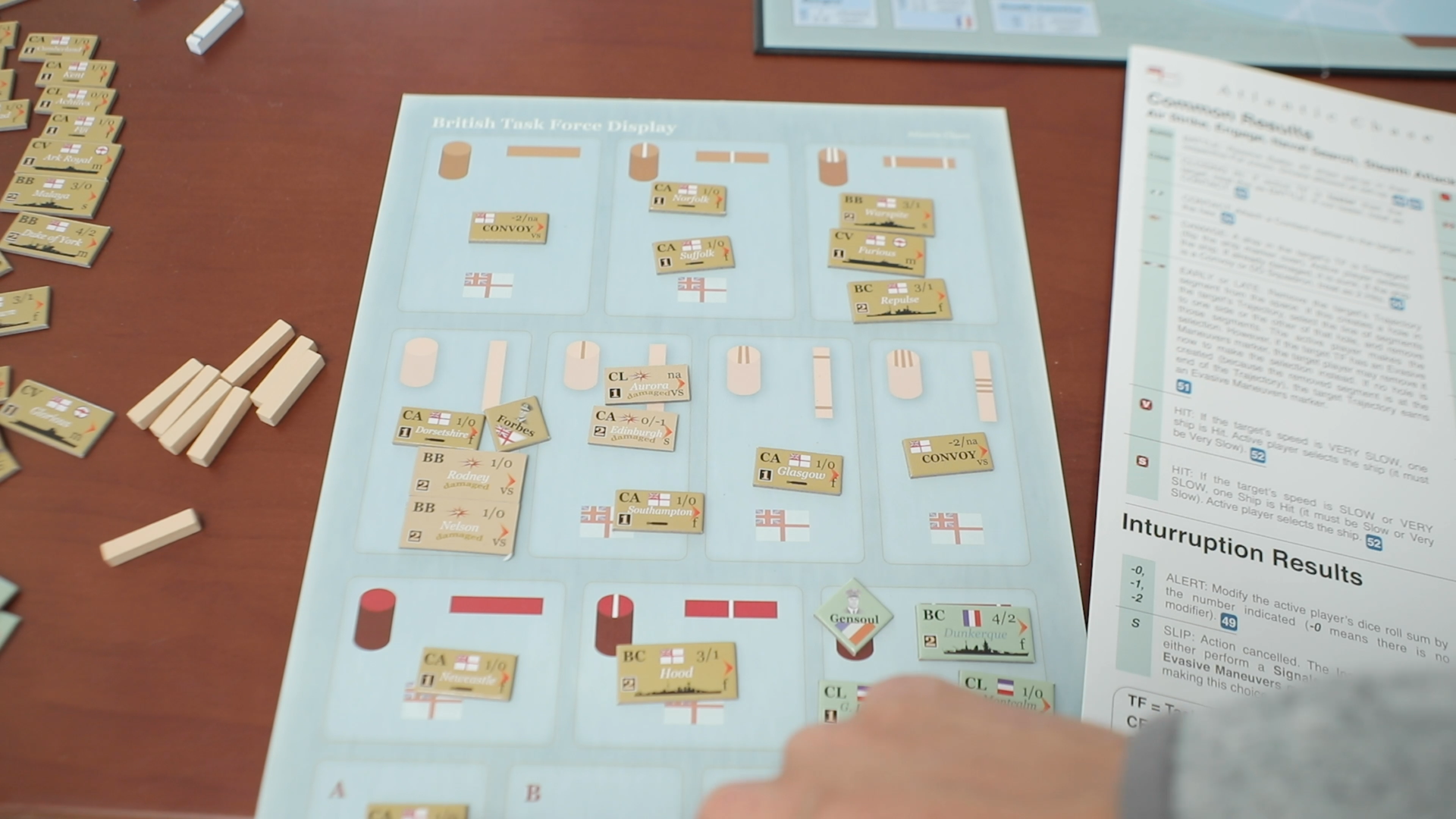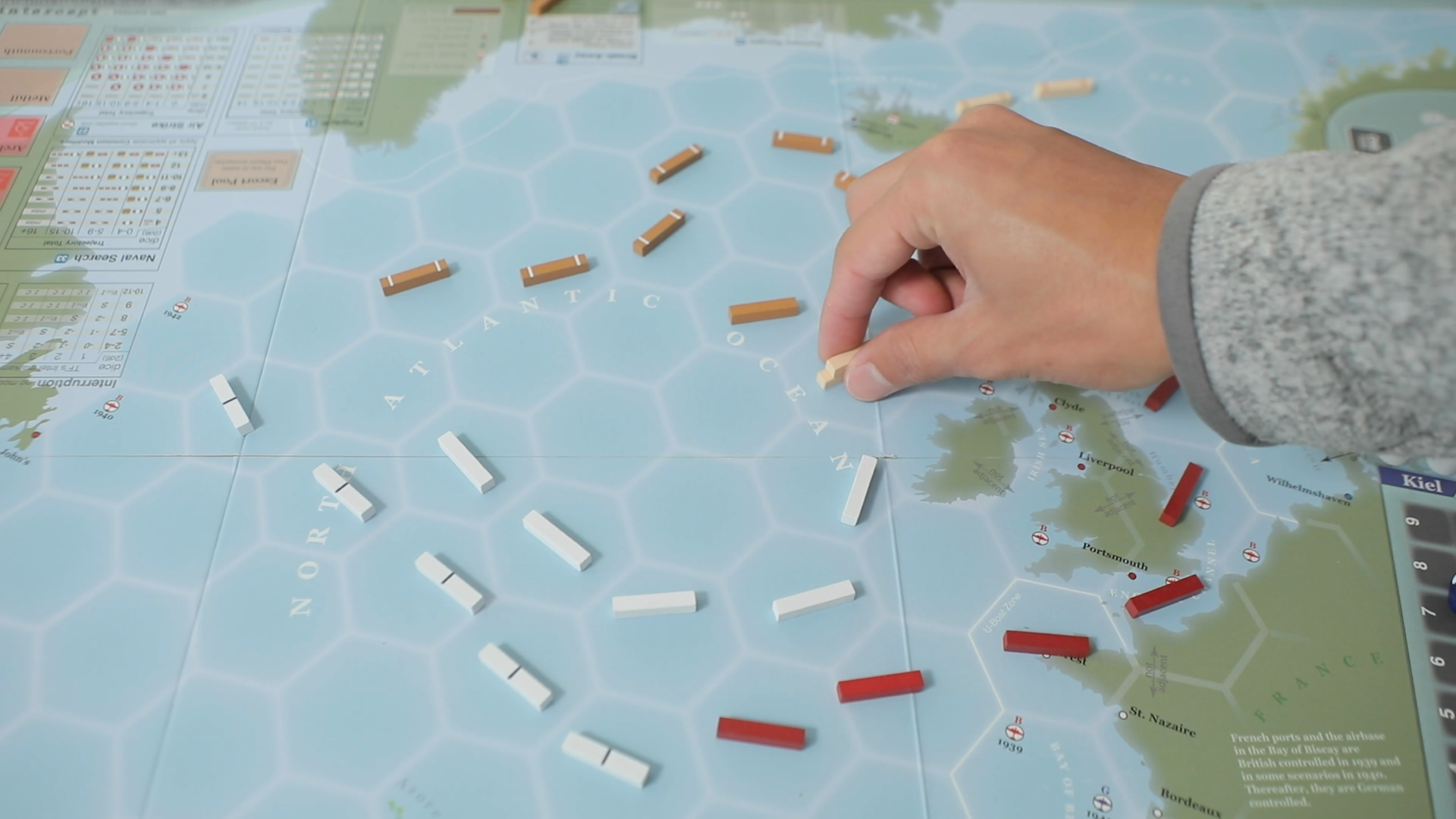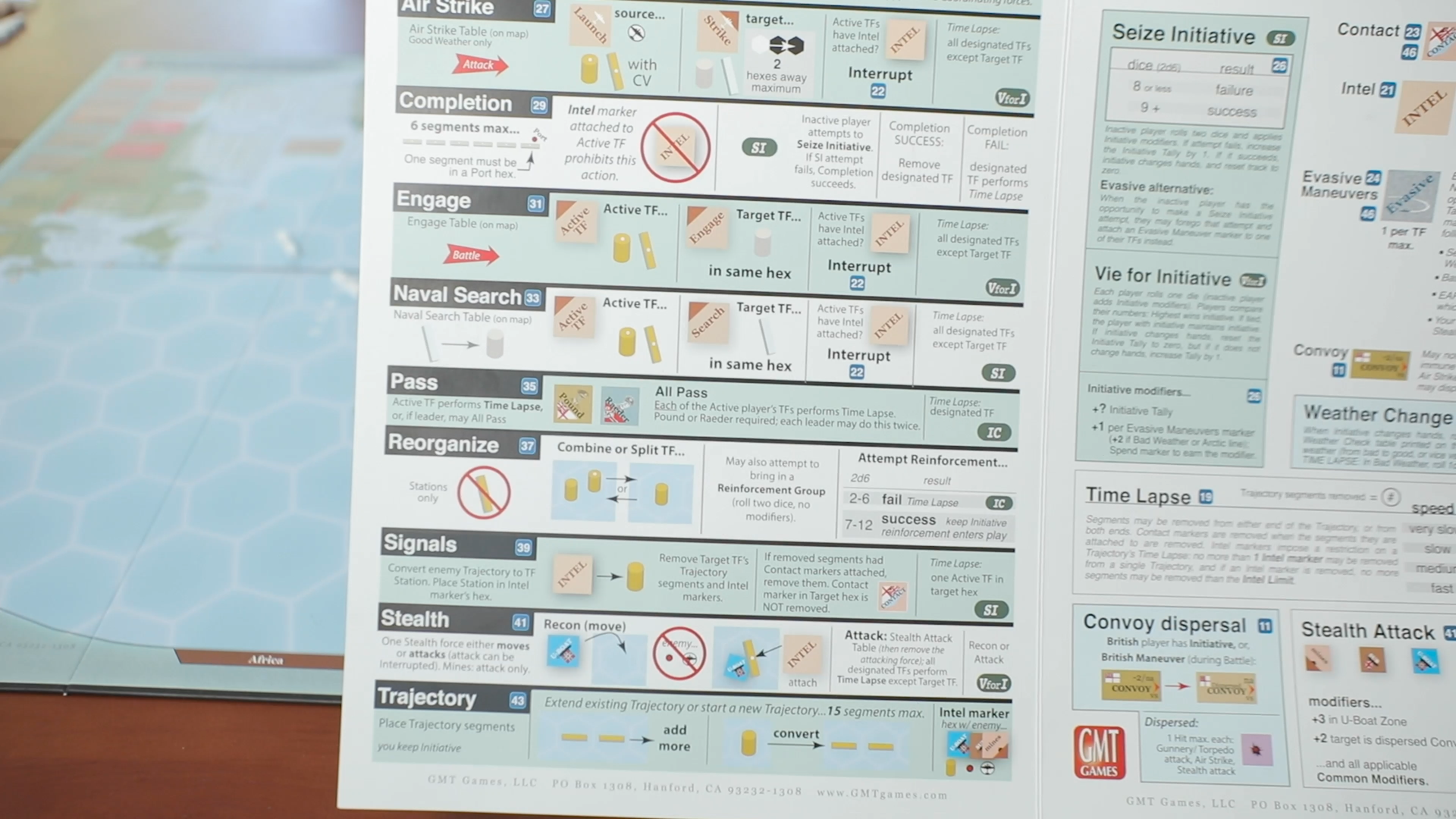Atlantic Chase Review
1939. Hidden movement magic in World War II.
The duel between the Kriegsmarine and British Home Fleet boasts a revolutionary movement system, with gripping-yet-abundant dice rolling to secure the Atlantic Ocean. 1-2 players, 1-5 hours.
Video published May 19th, 2021

Control the British or German fleets.

Trek a path using the innovative movement system.

Choose from 8 naval actions a turn.
Overview & How to Play
One player is playing as the mighty British empire versus the stealthy Kriegsmarine in one of many scenarios of World War II. Win conditions mostly revolve around: escape with your weak ships to your own ports, and sink the enemy’s ships. Can be played solo.
Atlantic Chase has players placing trajectories, which plots a course for all the ships in a certain group. Where are the ships along that path? You’ll find out as you take actions!
This is the key innovative mechanic of Atlantic Chase, where its odd in that moving any ship, you’ll give public information on where it could go, then you’ll need time to pass after you perform other actions. As your perform other actions, you’ll remove some of those tokens for each of your paths set. Once enough time passes and you remove all of your tokens for one path, the last path you removed becomes a ‘Station’, the hex where you ships are currently.
Pros
Right away, holy cow is this game worth your money in terms of sheer content. Not only are there sheets of scenarios, aids, and variants (AND rules), but there’s a boatload of wooden pieces. There’s chit upon chit of ships, like the British have over 50 ships to use, many with unique stats and names, including aircraft carriers like the Glorious!
Of course we have to praise the innovative trajectory system, which is a system that has not been in any other game before, and just ends up being an amazing device to make you really feel like a fleet commander. Information is imperfect: you don’t want to give orders to just make any route, lest you get intersected in a bad location, and in fact, sometimes you’ll want to try some trickery and choose an unorthodox path to port!
Things start to get really dense when you factor in that every single Task Force on the board can perform 8 different actions. Gameplay feels snappy and tense with players doing as many actions as they want, but they can always ‘steal’ the turn from someone through the right interruption die roll.
Atlantic Chase is long, and does an amazing job of just dialing you into constantly updating your strategies, because the board state always changes. Damaged ships move much slower, routes will be broken and reformed, and the legendary Bismarck being sunk will send ripples across the ocean.
In its entirety, Atlantic Chase just nails this feeling of being in a war room, just riddled with anxiety in this massive naval conflict. There’s uncertainty abound, with where your ships are, if the checks will really succeed, and even weather!
Cons & Nitpicks
Yeah, speaking of weather, there is a LOT of randomness going on in this game. This isn’t strictly a bad thing when you realize… oh, wartime randomness was a HUGE thing in the Atlantic Ocean, but be mindful of plenty of die rolls.
There’s also the GMT scruff to deal with: like the game being bloated with too many components, the learning curve being a nightmare, (even with the included tutorial booklet) and no sort of storage solution at all. The rulebook is an utter nightmare to read from front to back, using a weird conversational manner that helps to confuse, and the player aids are a saving grace.
For the scenarios, really, set aside your plans and plan on going DEEP for hours and hours, because it will be hard to predict how long each scenario will take. Aside from the 1st scenario, following 2 player scenarios are ridiculous in scope, with frequently more than a dozen ships for the British to handle. There’s room for you to just freeze up with analysis paralysis, because of the crazy options from right off the bat.
Final Thoughts
We only give a Tentative score on Atlantic Chase, because we’re just scratching the surface of what the scenario booklets have to offer even after countless hours of gameplay. The 7/10 is off of this being in the context of a board game review, where us at Shelfside set the standard comparing this to other board games. If we only covered war games, this score would be higher.
Atlantic Chase absolutely delivers its promised ‘chase’ in naval gameplay. It’s fueled by this totally new type of movement system, of which has been in development for apparently 15 years, and the dedication shows. Like, you are always on your feet in the thrill of the hunt with every single action. In this multi-layered dog-chasing-cat-chasing-mouse game to rewrite history, you have the immense pressure of controlling multiple hunting and hunted task forces. And then the big question for you, you big naval commander: what will happen with the wartime randomness, and how will you react to it?
Yes, dice. If you dislike rolling dice, or are any sort of dice skeptic, RUN AWAY. The dice rolling is in 8/9 actions. With the “Murphy’s Law” of anything can go wrong it war, this has all of the insane output randomness with picking something to do, and then rolling dice.
The luck just doesn’t even out either, because crucial ships getting sunk completely changes the game’s pace, and the Weather change can just completely screw over the Graf Spee’s changes of survival, man the Atlantic Ocean is fickle. Bad weather or not, you will often have to check small tables for the dice, with adding modifiers constantly, and that can get tiring for some in these multi-hour games.
The hidden movement is just so unique though, where putting down and picking up so many wooden trajectories constantly changes ships’ whereabouts, as you and a buddy share the exact same view of the ocean, while planning in their head where they want those ships to actually end up. Maybe you could retreat on your next time lapse, instead of advancing? The game just performs all these cool mind games without lying or cards!
Atlantic Chase just smashes into the iceberg and drowns when it comes to accessibility— again from our board gamer point of view. War gamers likely won’t be bothered much, and if you fall into that group, you probably already have your own system to organize all of the pieces.
For us, even after organized, it clocked a little under 20 minutes to just set up the first solo playthrough! This is a quadruple wielding learning experience, as you tackle the tutorial, rulebook, player aid, and the many tables on the board. There’s a clear reference for everything, but no fast way to start, especially since the game’s movement system is totally novel. In reality, the game structure isn’t that complicated, with no weird phases or hidden cards, but it’s such a new type of game, with all sorts of die modifiers, that can really trip you up.
So if you’re a board gamer reading this, tread VERY carefully in deciding to pick this up; we don’t recommend this for most people, even if you’re interested in naval warfare. It has so many glaring accessibility flaws, which will turn off the vast majority of people who are not what this game dubs “a salty grognard”. Why not make the content in the box less, and use the time and money obviously poured into this game to make the learning easier so more people can enjoy it?
In all, Atlantic Chase is naval conflict love. It, and the designer Jerry White DEMANDS respect in how flavorful everything is, and how much BANG this box gives you. Aside from the trajectory mechanic that feels ABSOLUTELY at home here, there’s so many smaller mechanics we don’t have time to cover, like stealth attacks, ships coordinating, and even envoys dispersing! If you really want to take the plunge into this, like REALLY and don’t dislike dice, the strategy doesn’t disappoint. Like, really, buy Atlantic Chase, study long and hard, and become the naval commander you always wanted to be.
















